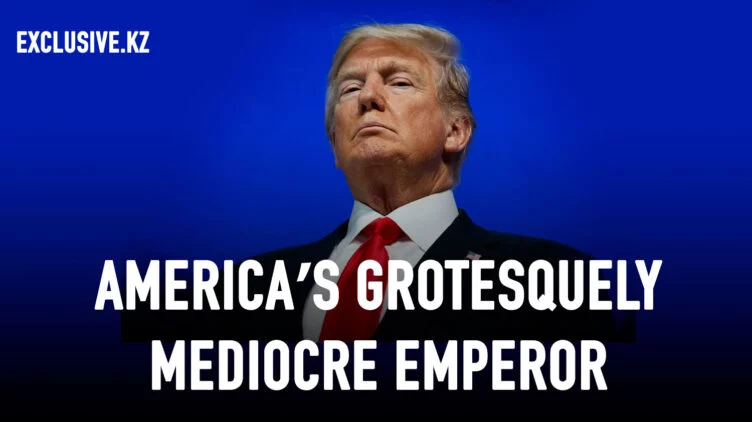“He who saves his Country does not violate any Law”?

For the past decade, scholars have been debating how to make sense of Donald Trump’s rise and rule. They have cycled through labels such as populism and fascism, and proposed various historical parallels – some of them rather outlandish (“Martin Luther Was the Donald Trump of 1517”). But now Trump himself has offered a hint, posting on social media that “He who saves his Country does not violate any Law” – a quote widely attributed to Napoleon, though most likely put into the emperor’s mouth by Balzac.
Napoleon is usually seen as a prime example of Caesarism, a term invented in the nineteenth century to characterize and legitimate a particular form of autocratic rule. Is it the label we’ve all been looking for? While there are some striking parallels, crucial elements of Caesarism are missing from Trump’s regime.
But first consider the similarities. Even before seizing power, Napoleon – like Trump – had intuited that propaganda is crucial to modern mass politics. He personally edited bulletins about his army’s victories and commissioned a steady stream of self-promotional pamphlets, portraits, and newspapers with titles like the Journal of Bonaparte and Virtuous Men. While references to Caesar – a towering figure of antiquity – were common, only in 1800 was the public graced with a volume comprehensively establishing A Parallel Between Caesar, Cromwell, Monck and Bonaparte. It was authored by the interior minister, Napoleon’s brother Lucien.
Those drawing this parallel emphasized that a Caesar is a charismatic leader who (crucially) channels “the will of the people.” Napoleon’s nephew Louis – who was elected president in 1848, retained power by means of a coup d’état in 1851, and later crowned himself emperor as Napoleon III – seized on this when he reintroduced universal male suffrage after conservative elites had restricted the vote to the propertied.

But there were always limits to Napoleonic democracy. Both Napoleons relied not only on propaganda but also on the police, censoring criticism and clamping down on opposition. When they held plebiscites, the point was to demonstrate overwhelming popular support for something they were going to do anyway. They sought to liberalize the political system only when they started to face significant political uncertainty and pushback – Napoleon I in the 100 days after his return from Elba, and Napoleon III during the final years of his reign.
Napoleon has been called a modern “media emperor,” and both Napoleons relied on spreading the story of their improbable rise (Napoleon III’s surprise 1848 election, after several failed coups, eerily resembles Trump’s unlikely return to power). But they also sought to produce spectacular achievements to keep citizens enthralled. As Napoleon Bonaparte put it, “a new-born government like ours needs to amaze and astonish people, in order to consolidate itself, or it will go under.”
His means were, of course, martial. He sought to demonstrate a popular touch in his relationship with the army, “treat[ing] his soldiers as equals, addressing them in deliberately familiar, emotional language,” the historian David Bell writes. But in addition to military glory, Napoleon embellished Paris with spectacular edifices and had his engineers improve the water supply and the sewage system.
Napoleon III also pursued spectacular feats of urbanism. His prefect of the Seine, Georges-Eugène Haussmann,built famously beautiful boulevards long enough to offer astonishing vistas – and wide enough to deploy the military quickly in case of insurrection. In an early instance of gentrification, workers and the poor were systematically displaced from the city center.
Trump also has an architectural agenda. One of his lesser-noted day-one executive orders, “Promoting Beautiful Federal Civic Architecture,” calls for a return to federal buildings in the classical style (the result, if any, will be gilded McMansion-like edifices with “engraved concrete and foam columns wrapped in plastic,” one critic predicts). Similarly, Trump’s rhetoric about enlarging the US to include Canada and Greenland is reminiscent of the darkest days of nineteenth-century imperialism, when glory was equated with territorial expansion.
More to the point, Trump’s only real talent lies in exploiting our willingness to buy his image as a successful businessman, even though his actual business career was a string of failures. In this regard, he resembles Napoleon III, a “grotesque mediocrity,” according to Karl Marx, who lived off a fantasy of grandeur. In his case, the fantasy proved popular enough to pull off what political scientists call an autogolpe (self-coup): a leader who comes to office legally using unlawful means to remain in power. Trump, having failed on January 6, 2021 in such an endeavor, might try again during his second administration.
Still, the Caesarism analogy is ultimately flawed. At the most basic level, Trump lacks accomplishments. When Goethe praised Napoleon’s “productivity of deeds,” he was not just talking about battlefield victories. Here was a self-made man who went on to remake the French state and legal system.
Whereas both Napoleons managed to present themselves as figures who had transcended parties and classes with the breadth of their popular support, Trump is a militantly partisan Republican who is advancing his party’s goal of cutting taxes for the wealthy. Far from single-handedly dragging the US state into the future, his ally Elon Musk is wantonly sabotaging it. Where the Napoleons promised order and an end to revolutionary upheaval, Trump and his henchmen. apparently enthralled with the idea that “disruption” is good for some businesses, are purposefully sowing chaos.
Trump’s throwaway line about being above the law does not speak to Caesarist aspirations. It is nothing more – or less – than run-of-the-mill authoritarian rhetoric designed to legitimize violence. El Salvador’s autocratic leader, Nayib Bukele, has posted the same phrase, and it also appeared in the Norwegian mass murderer Anders Breivik’s manifesto. In the name of defending Europe against Islam, he killed 77 people in Oslo and on a nearby island in 2011. Et tu, MAGA?
Copyright: Project Syndicate, 2025.





Все комментарии проходят предварительную модерацию редакцией и появляются не сразу.